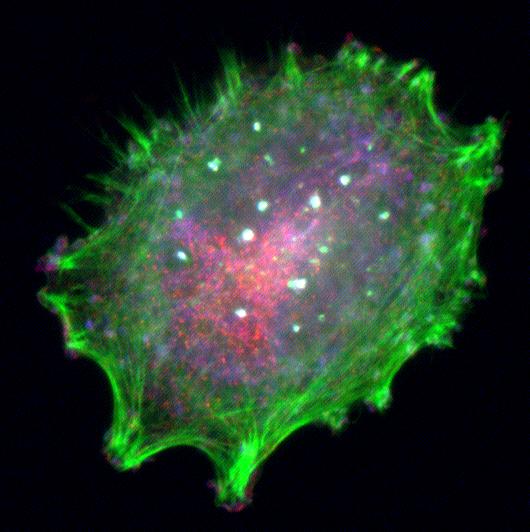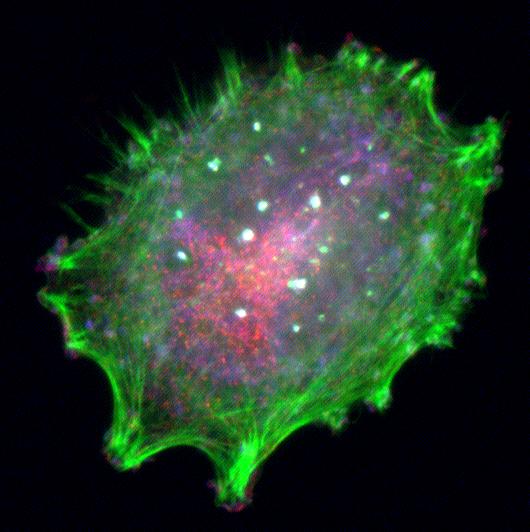
Credit: Yueyao Zhu and Wei Guo
In 2014, new combination therapies to treat patients with metastatic melanoma hit the market, helping extend the lives of those with this aggressive disease. Yet unfortunately, after several months of treatment, almost all patients on the regimen eventually relapsed.
A study out this week in Nature, led by scientists from the University of Pennsylvania and The Wistar Institute, reveals why these relapses occur. While the combination therapies block off the principal pathway that cancer cells use to fuel their growth, the cells come to bypass this blockade and, like vehicles on a detour route, make use of additional pathways to continue growing and spreading.
"The tumor cells are smart," said Wei Guo, co-corresponding author on the study and a professor of biology in Penn's School of Arts and Sciences. "Once they block this first pathway, then other pathways can get activated, leading to an even more aggressive disease."
These parallel pathways, governed by the PAK family of enzymes, present appealing new targets for melanoma treatment.
"Our findings provide a possible flanking strategy to counteract the ability of melanoma cells to re-wire their signaling networks," said co-coresponding author Meenhard Herlyn, Caspar Wistar Professor in Melanoma Research and director of the Melanoma Research Center at The Wistar Institute. "When cancer gets smart, we have to act even smarter."
Guo and Herlyn collaborated on the work with co-corresponding authors Xiaowei Xu, a professor of pathology and laboratory medicine and dermatology at Penn's Perelman School of Medicine. The lead authors on the paper are Hezhe Lu and Shujing Liu of Penn and Gao Zhang of Wistar.
Around half of all melanomas are attributable to a mutation in a gene caled BRAF. When mutated, BRAF, an enzyme that acts in a signaling cascade known as the MAPK/ERK pathway, becomes overactive and leads to increased cellular growth, a hallmark of cancer. Accordingly, drugs have been developed to inhibit BRAF. These therapies have been modestly successful, but some patients fail to respond entirely and those who do respond almost inevitably develop resistance.
To bolster the effects of the BRAF inhibitors, recently a new class of drugs was developed to block an enzyme that acts downstream of BRAF/MEK. Pairing the BRAF inhibitor with the MEK inhibitor has given patients with advanced melanoma one of their best treatment options to date. But like the BRAF-inhbitors, the effectiveness has been transient.
Several years ago, Guo and his postdoctoral researcher, Lu, were fascinated to find that drug-resistant melanoma cells were more aggressive than their parental strains in cell-culture assay. To uncover how this resistance occurs, Guo and Lu teamed with Xu, Herlyn and colleagues examined both cell lines and tumor biopsies from melanoma patients before and after either BRAF inhibitor therapy or BRAF/MEK inhibitor combination therapy. As other groups had previously shown, they found that treatment with BRAF inhibitors alone seemed to reactivate ERK, which is downstream of BRAF in the MAPK pathway.
But in many cell lines and patient samples that developed resistance to the combination therapy, the researchers observed something different happening. ERK was not reactivated. Instead, they found that a parallel pathway, governed by the enzyme PAK, was energized.
"We found not only was PAK activated in many patients, but also PAK's downstream targets," Guo said.
Treating cells resistant to combination therapy with a PAK inhibitor reduced their ability to grow. When the researchers did the opposite, turning on a PAK protein in a metastatic melanoma cell line, they found the cells became even more resistant to inhibitors of the MAPK pathway.
PAK proteins allow melanoma to thrive through their action on a few different pathways, both encouraging cell cycle progression and inhibiting apoptosis, a form of cell death, the researchers found.
Interestingly, cancer researchers had previously attempted to block PAK as an anti-tumorigenic strategy in the past, only to find it didn't seem to do anything to stop melanoma progression.
"It seems it is only when the ERK pathway is inhibited that PAK becomes 'awake,'" Guo said. "Then you can apply the PAK inhibitor and see an effect."
"Our discovery may direct new drug development efforts to target PAKs," said Xu.
Looking to the future, the Penn-Wistar team sees promise in targeting PAKs as an additional tool to target melanoma tumors. They are following up on some of the parallel pathways downstream of PAK to determine how they operate, and are also pursuing research into immunotherapy approaches in melanoma treatment.
###
In addition to Guo, Xu, Meenhard, Lu, S. Liu and G. Zhang, coauthors included: Penn School of Arts and Sciences' Bin Wu, Yueyao Zhu, Wenqun Zhong, Wei Zhang, Gang Chen, Jingwen Zen and Claire D. Song; Penn Medicine's Xiaoming Liu, Wei Xu, Jephrey Y. Liu, Lynn M. Schuchter, Jeffrey Field, Giorgos C. Karakousis and Ravi K. Amaravadi; Wistar's Sergio Randall, Norah Sadek, Lawrence W. Wu, Clemens Krepler, Katrin Sproesser, Min Xiao and Jianglan Liu; Massachusetts General Hospital's Dennie T. Frederick, Benchun Miao, Ryan J. Sullivan, Keith T. Flaherty and Genevieve M. Boland; Drexel University's Yi Hu; New Jersey Institute of Technology's Chaoran Cheng and Jie Zhang; The University of Texas MD Anderson Cancer Center's Yiling Lu and Gordon Mills; Hangzhou Normal University School of Medicine's Yusheng Cong; Fox Chase Cancer Center's Jonathan Chernoff and Peking University's Jun Guo.
The study was supported by the National Institutes of Health (grants GM085146, CA193417, CA174523, CA114046, CA25874, CA025874 and CA114046) and the Dr. Miriam and Sheldon G. Adelson Medical Research Foundation.
Media Contact
Katherine Unger Baillie
[email protected]
215-898-9194
@Penn
http://www.upenn.edu/pennnews
Related Journal Article
http://dx.doi.org/10.1038/nature24040





